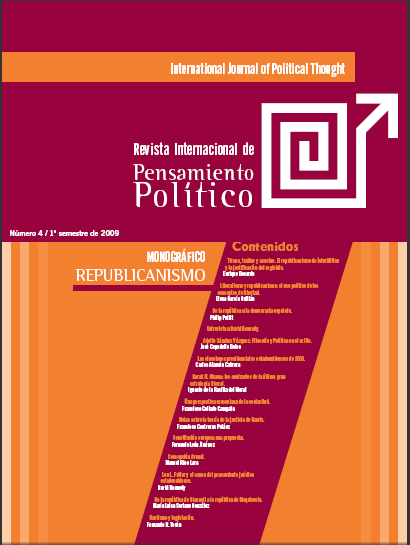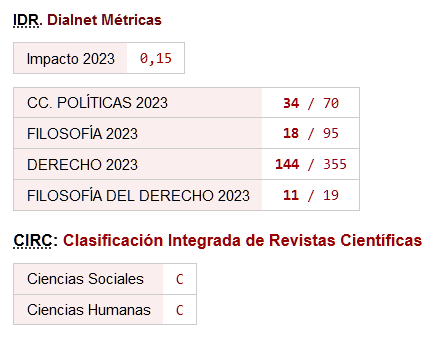‘Tyrant, Traitor and Killer’: John Milton and the Justification of Regicide
DOI:
https://doi.org/10.46661/revintpensampolit.1577Keywords:
grounding beliefs, John Milton, Regicide, justification , Quentin SkinnerAbstract
The aim of this paper is to offer a tentative attempt to understand Intellectual History, particularly John Milton´s justification of Regecide, in terms of grounding beliefs. Grounding beliefs are the set of basic beliefs which should be taken into account in order to understand the reasons and ends to which a particular political text is meant to aim. As a result of that, two major obstacles in Quentin Skinner’s approach to Intellectual History are emphasized. One is the rejection of motives and reasons, and the other the limited extent of the notion of convention, as the key concept to unfold the meaning of the text.
Downloads
References
Foxe, J. Acts and Monuments of these latter and perilous days. The Religious Tract Society, Londres, p. 1-5.
Skinner, Quentin. “Motives, intentions and interpretation”, Visions of Politics, vol. I, Cambridge University Press, pp. 90-102, p. 98. DOI: https://doi.org/10.1017/CBO9780511790812.008
Ralegh,Walter. The History of the World. En The Works of Sir Walter Ralegh, 1829, vol ii, p. 42.
Milton. Eikonoklastes. En The Complete Prose Works of John Milton, vol. iii. Yale University Press: 1962, p. 598.
Downloads
Published
How to Cite
Issue
Section
License
Copyright (c) 2015 Revista Internacional de Pensamiento Político

This work is licensed under a Creative Commons Attribution-NonCommercial-ShareAlike 4.0 International License.
Open access policy
Free and open access is allowed to any interested party to all the contents of the journal issues, free of charge, being able to print and transfer all the articles, with the only condition of specifying the source and authorship.
The journal: a) does not charge authorship costs for the processing of articles or for their submission, b) maintains copyright for authors without restrictions, c) facilitates authors to keep their publication rights without limitations.
The International Journal of Political Thought is an original work of the Laboratory of Political Ideas and Practices of the Pablo de Olavide University. All articles included in the Journal are original work of their respective authors. This Journal is freely offered to the scientific and academic community at no cost and releases the contents according to the license "Attribution-NonCommercial-ShareAlike 4.0 CC BY-NC-SA" of the Creative Commons project available in the following url: https://creativecommons.org/licenses/by-nc-sa/4.0/legalcode
If you wish to translate or compile any of the articles available here, please contact us at contacto












 ISSN: 1885-589X
ISSN: 1885-589X  Universidad Pablo de Olavide
Universidad Pablo de Olavide